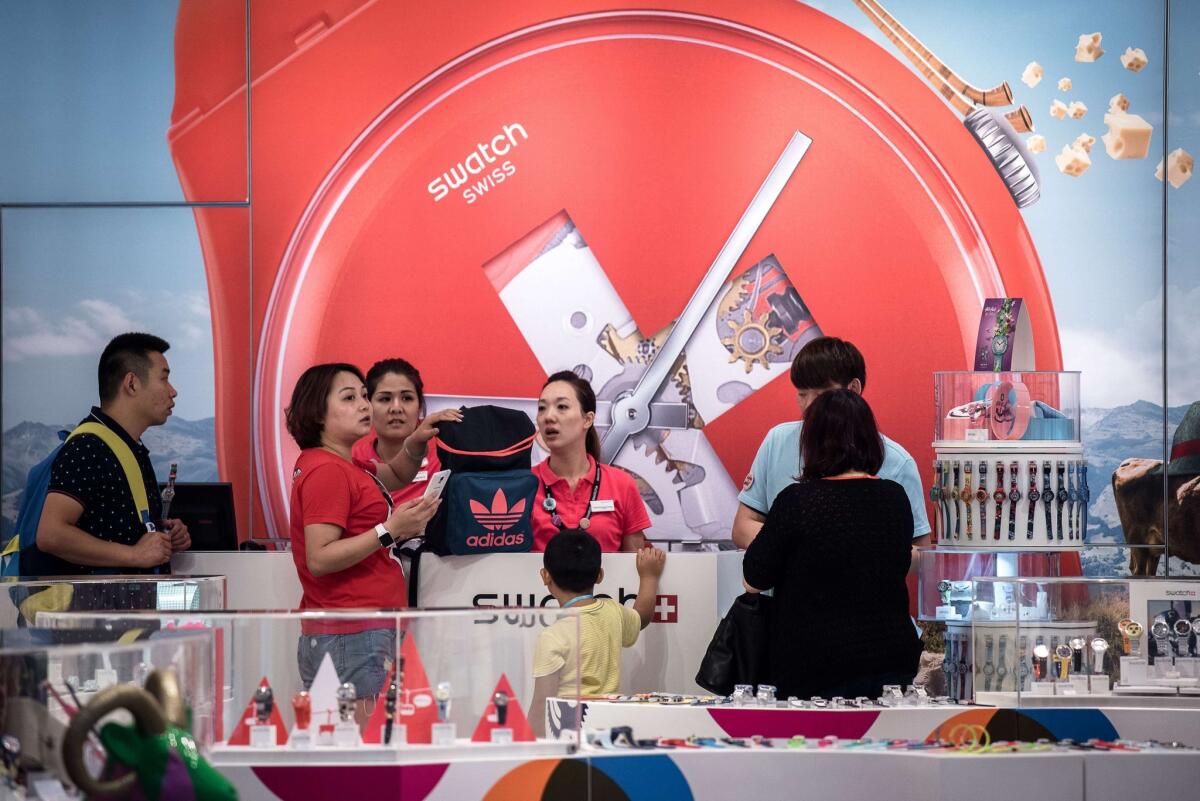In China, strong-arm tour guides are forcing people to shop

People shop at a watch store in Hong Kong.
Reporting from Beijing â It may sound like a spendthriftâs dream vacation: being âforced to shop.â But as tourism booms in China, many travelers on budget package trips are complaining that theyâre being strong-armed by guides into purchasing jewelry, cosmetics, electronics and other goods â and now, the practice appears to be taking a deadly turn.
A 54-year-old construction contractor from northern China was beaten and died this week in Hong Kong after he tried to mediate a fight between a tour guide and a fellow traveler who did not want to buy anything in a jewelry shop. The case has sparked outrage across the country, fueling demands for more regulation while raising concerns about growing tensions between mainlanders and locals in Hong Kong, a former British colony.
And it has cast a light on group tours in which the phrase âshop âtil you dropâ takes on a whole new meaning.
See the most-read stories this hour >>
Officers who arrived at the shop in Hong Kong on Monday discovered the man, Miao Chunqi, unconscious; witnesses told police he had been beaten by four men who fled. Miao was taken to a hospital and died the next day, police said. Authorities are investigating the case as manslaughter and have arrested two men, while two others remained at large Wednesday. An autopsy was underway to determine exactly how Miao died, but his wife told a local newspaper that he had no serious health issues.
Meanwhile, the two women who were arguing have also been arrested on charges of fighting in a public place.
Joseph Tung, executive director of Hong Kongâs Travel Industry Council, which can sanction tour guides, agencies and shops for violating regulations, said it was the territoryâs first case of a fatal attack on a mainland tourist â though in 2010, a 65-year-old mainland man died of a heart attack in Hong Kong after arguing with a tour guide over being forced to purchase goods.
Tung told the South China Morning Post that this weekâs incident might deter other mainlanders from joining tour groups to Hong Kong.
More than 47 million mainlanders visited Hong Kong last year â making up 77% of arrivals â but the numbers have been dropping amid growing disputes over etiquette issues such as urinating in public and political tensions after last yearâs 10-week-long âUmbrella Movementâ pro-democracy demonstrations.
Rising disposable incomes have fueled a domestic and international Chinese tourism boom in recent years, with retailers from Paris to New York to Beverly Hills adding Mandarin-speaking clerks to cater to Chinese travelers on spending sprees. China is the No. 1 source of foreign tourists to Los Angeles, accounting for about 10% of the 6.5 million overseas visitors to L.A. last year.
After initially opting for group trips, many Chinese travelers are now venturing on self-guided vacations abroad.
But millions of older or less well-to-do vacationers are still signing up for low cost or âno costâ group trips closer to home â and then finding themselves literally held hostage during shopping excursions arranged by tour agencies who get a cut of the sales. Travelers have reported being berated, denied food, threatened with violence and warned they would have no place to sleep unless they spent a certain amount at designated shops. In September, 43 mainland China shoppers were reportedly locked in a jewelry store in Hong Kong for hours (link in Chinese).
Guo Junping, a 55-year-old retiree from Henan province, is among those who learned the hard way that a âfreeâ five-day trip to Hong Kong and Macao was anything but. The vacation was promoted by an insurance agency in her hometown, Luohe, and employees of the agency assured her that theyâd been on the trip and there was no catch. But as soon as she and two dozen others showed up for the bus to the airport, they were asked for about $50.
Over the next four days, she said, her group was compelled to spend hours in a jewelry shop, an electronics dealer, a chocolatier and a cosmetics boutique. At the jewelry shop, she said, she was pressured to spend more than $300 on a necklace charm.
âAfter an hour, some people in the group wanted to leave, and then the door was shut and we werenât allowed to go,â she recalled, adding that travelers were told they were not allowed to use their cellphones in the shop. âThe tour guide announced that anyone who had bought things should come to her and register their purchases; those who didnât buy things were pressured and scolded.â Guo said her initial purchase â a $70 bracelet â was rejected by the guide as insufficient to meet her quota.
In Hong Kong, the only touristic site the group visited was the Ocean Park amusement park; other points of interest were only visible from the bus windows. Later, in Macao, Guo and the other retirees were forced to shell out $64 for an exotic dance performance â and tip the performers.
When the tour finally reached the airport in Zhuhai for the flight home, she said, âwe felt we were finally liberated. Until then, we felt like we were in prison. We had no personal freedom to do anything.â Guo ended up spending more than $800 total. âWe felt that this was really illegal to have these kind of trips.â
Itâs not only retirees on a budget who are finding themselves at the mercy of predatory tour guides. A 26-year-old woman who took an eight-day trip to Yunnan province with a friend earlier this month said she chose an expensive tour so as to avoid âforced shoppingâ but wound up being pressured to buy jewelry and silverware. The tour guide carried a knife, and after she called the tour agency to complain, she said the guide pressed her to withdraw her report.
âHe said if I didnât withdraw my complaint within 10 minutes, he would âfind someone to hang out with me,ââ she said. âI got too scared and the agency and the guide knew all my info, and I feared for their revenge, so I didnât do anything.â The woman asked not to be identified for fear of reprisals from the guide or the agency.
Chinaâs National Tourism Administration this week âblacklistedâ 10 travel agencies for âirregularitiesâ; five had their licenses revoked and the other five were âheavily fined,â the state-run New China News Agency said. Seven other guides were punished, the agency said. Complaints over forced shopping are among the top issues travelers report to the administration, the agency added.
The state-run newspaper Global Times said this weekâs beating death in Hong Kong â proved forced shopping tour groups have been rampant in the marketâ and revealed âa serious loophole in the rule of lawâ in the tourism industry. It also predicted that the incident would âfurther damage Hong Kongâs image in mainlandersâ minds.â
But other commentators said travelers who opted for free or super-low-cost tours ought to know that such offers were too good to be true.
âThereâs no doubt that there were evil businessmen and mafias involved in the death of the Chinese tourist in Hong Kong,â said Wuyue Sanren, a Beijing-based blogger. âBut everyone knows that you canât get an Audi for the price of an Alto [a cheap, small, Chinese-made car]. The main [problem] here is greed.â
Tommy Yang and Nicole Liu in the Timesâ Beijing bureau contributed to this report.
Follow @JulieMakLAT for news from China
ALSO:
How âChineseâ will Shanghai Disney be?
Chinaâs fashionistas diving head-first into a new fad
Survivors tell the camera the hidden tale of Chinaâs Great Famine
More to Read
Sign up for Essential California
The most important California stories and recommendations in your inbox every morning.
You may occasionally receive promotional content from the Los Angeles Times.











